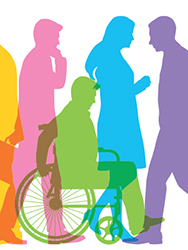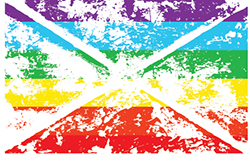 As diversity and inclusion in the workplace become a business and human imperative, where do Jersey and Guernsey stand? and are they lagging behind the UK and Europe?
As diversity and inclusion in the workplace become a business and human imperative, where do Jersey and Guernsey stand? and are they lagging behind the UK and Europe?
There’s nothing like a racially intolerant White House, revelations of entrenched sexual abuse in Hollywood and a rise in hate crimes against LGBT people to breathe real vitality into business buzzwords. Just when the concept of diversity was threatening to tip into an empty, corporate tick-box exercise, events in the wider world have conspired to remind people just how vital the concept has been all along.
When PwC ran a survey of more than 800 organisations around the world in 2016, 87 per cent said diversity and inclusion was a stated value or priority. Diversity in this instance means ensuring there’s a balance of everything from race and religion to gender and sexual orientation, even age, experience and trade. Inclusion means giving all of those people an equal voice across the organisation.
The business logic is well understood: a more diverse and inclusive workplace will lead to a wider variety of perspectives and ideas, create greater engagement among employees and generate more creativity and productivity.
Such a company will also be more likely to relate to its client base – itself increasingly diverse – and thus have a better chance of winning extra work.
And all of this ultimately boosts profitability. According to McKinsey, companies in the top quartile for gender diversity are 15 per cent more likely to have financial returns above their national industry average. Companies in the top quartile for racial and ethnic diversity, meanwhile, are 35 per cent more likely.
But while it’s predictable that business should number-crunch its way to a rationale for such change, it would be remiss to skip over the other driver here – the human element. Surely diversity is simply business taking the step to give everyone the same chance of living a meaningful life? ‘What’s the alternative?’ is a question that, until recently, may have been asked rhetorically. We’re now starting to see just how regressive the answer is.
“If you’d asked a Victorian industrialist about the health and safety of his workers, he’d have asked you to provide a business case for why he should care if they suffer in his mills and factories,” says Paddy Haversham-Quaid, Chief Experience Officer at Liberate, the Channel Islands’ equality and diversity charity.
“Today, we know better,” she says. “As leaders of organisations, we should know we have a moral duty to keep our employees safe, irrespective of any legal obligations. And in our global economy, where technology is shrinking the gaps between peoples and countries almost daily, we should be approaching diversity in our organisations in the same way – as a moral duty, not simply as an investment that provides a return.”
Playing catch-up
Organisations such as Liberate and the Guernsey Employment Trust (GET), which helps disabled and disadvantaged people prepare for, find and maintain work, show how diversity is finally making headway in the Channel Islands. This is good news. Business here has traditionally been as straight and white as a vapour trail. Yet despite the good intentions, it’s clear the islands have been playing catch-up.
The population is limited by geography, and even by law, given the limited number of licences granted to organisations to bring in new employees. So when it comes to opening up the recruitment process, even the most ‘woke’ company will struggle more than an equivalent in London.
Yet a financial services company in the Channel Islands is as likely to be dealing with clients in Asia or Africa, or dealing in fields such as Islamic finance, and thus would benefit equally from a diverse team.
Claire Malkoun, Head of Business Development at VG, moved back to Jersey in 2016, after working in London with the law firm Ashurst. There, she’d worked alongside the company’s Head of Diversity, hosting events around gender balance and LGBT representation in the workplace.
 “Working there really increased my awareness of diversity, mental health and unconscious bias,” says Malkoun. “It was very moving to hear people’s experiences. It’s about being human, staying in tune with people from different beliefs and backgrounds, and having respect for their voice, so people have the confidence to reach for new positions or to pursue their ideas.”
“Working there really increased my awareness of diversity, mental health and unconscious bias,” says Malkoun. “It was very moving to hear people’s experiences. It’s about being human, staying in tune with people from different beliefs and backgrounds, and having respect for their voice, so people have the confidence to reach for new positions or to pursue their ideas.”
There are thousands of such stories out there of individuals blocked from making a meaningful contribution, whether suffering debilitating self-doubt through anxiety or depression, or being turned away at interview because of their sexual orientation or because their own beliefs are more progressive than those of their employer. These are things many of us simply don’t have to worry about, and yet are surely not traits that should be derailing career progression.
“By taking steps to prevent discrimination, and removing barriers in the recruitment and selection process, businesses can increase the pool of talent available and ensure that they’re recruiting the right person for the job,” explains Nicola Ioannou-Droushiotis, Chief Executive at GET.
Working in London, Malkoun was struck by the strength of commitment to diversity, from the company’s senior management, as well as from its clients, who often made diversity a requirement for doing business.
“Clients would challenge law firms on their diversity policy, their balance of men and women, how they cater for disabled people, and their provision for different religions,” she says, adding that she’s encouraged by the progress she sees being made in the islands.
Moving forward
There’s certainly movement here. In late 2016, Liberate launched DIFERA, an accreditation awarded to Channel Islands companies that focus on diversity, inclusion, fairness, equality, respect and acceptance. BCR Law, which has an employment practice specialising in advising employers in discrimination law, was the first Channel Islands law firm to have its workplace DIFERA-approved.
“We realised we needed to walk the talk around discrimination and do something internally with our staff,” says Wendy Lambert, a Partner at the firm. “With a population as small as Jersey’s, you don’t necessarily encounter certain issues day-to-day, so it’s having that awareness and being proactive, not just muddling through.
“The process has been really good: it’s about leading from the top, reviewing policies and procedures, keeping an open mind in recruitment, and training everyone to remember that people from all walks of life can each bring something different.”
The big question for the Channel Islands – given how entrenched the old ways are, and with restrictions on population – is whether they can make the desired changes, even if there’s the right intent, especially in sectors such as financial services.
“While the finance industry here is perhaps still predominantly white males, that is changing,” says Liberate’s Haversham-Quaid. “We have many other nationalities here and we’re encouraging clients to look at their recruitment processes, so they don’t simply follow the usual gut reactions around cultural fit, and instead open their minds to those who are different to them. So it’s certainly feasible that we can take organisations on a journey and give them the tools and language to be inclusive.”
The islands are certainly showing signs that they’re making progress – and quickly. In February, Jersey’s government approved amendments to the island’s marriage legislation that allows same-sex couples and couples where one or both partners are transgender to marry. It also voted down a law that would have legalised discrimination against same-sex couples.
Meanwhile, the States has quickly extended its discrimination legislation, first introduced in 2013, to include protections for race in 2014, sex, sexual orientation, gender reassignment, and maternity and pregnancy from 2015, and age in 2016. It has managed to catch up with the UK, achieving in five years what the UK took from 1973 to 2010 to achieve.
Ioannou-Droushiotis points out that in its three years of existence, GET has supported almost 200 disabled people into paid work, and many of the companies involved have become loyal customers, recruiting several staff with its help.
All of which shows that the islands do have the agility to act on diversity, if the will is there. So much change will come down to people’s attitudes and perceptions. Investing in awareness training, in other words, is key.
“I’ve had employers say to me before that they can’t employ people with disabilities,” says Lambert. “But what do they mean by that? People have told me their building isn’t suitable. In other words, some people who use a wheelchair may not be able to access certain parts of their building.
"But just a few minor adjustments could bring you a person with ideas, experiences and skills that you’ve never had before, which could transform your business.
“Don’t make assumptions – if someone’s applying, they know their capabilities better than anyone.”
THE DIFERA WAY
DIFERA is Liberate’s employer accreditation scheme. It aims to provide organisations across the Channel Islands with a quality mark that can be used to demonstrate their credentials as a diverse and inclusive employer. But how does it work?
When an organisation joins the scheme, Liberate undertakes an audit of the firm’s employees, from which it produces a report that sets out where an organisation currently stands on its DIFERA journey.
Liberate then facilitates the forming of a DIFERA champions group within the firm and works with it to produce a DIFERA strategy.
Liberate offers training to these champions, so that they can train their colleagues and provide inductions to new starters. Depending on the type of business, Liberate might be required to provide further specialist training.
Having met the above requirements and completed any remedial work required by the audit, a business will be admitted as an accredited member of the DIFERA scheme.
To find out more about the scheme, visit www.liberate.je/difera